| Listing 1 - 10 of 22 | << page >> |
Sort by
|
Book
ISBN: 363146780X 9783631467800 Year: 1994 Volume: 88 Publisher: Frankfurt am Main New York Peter Lang
Abstract | Keywords | Export | Availability | Bookmark
 Loading...
Loading...Choose an application
- Reference Manager
- EndNote
- RefWorks (Direct export to RefWorks)
Epic poetry, Greek --- Odysseus (Greek mythology) in literature. --- Nestor (Greek mythology). --- Aesthetics, Ancient. --- Literature. --- Epic poetry, Greek. --- Demagogie. --- History and criticism. --- Agamemnon, --- Homerus, --- In literature.
Book
ISBN: 0815317271 Year: 1994 Publisher: New York (N.Y.): Garland
Abstract | Keywords | Export | Availability | Bookmark
 Loading...
Loading...Choose an application
- Reference Manager
- EndNote
- RefWorks (Direct export to RefWorks)
Epic poetry, Greek --- Gods, Greek, in literature --- Greek language --- History and criticism --- Epithets --- Homerus --- Homerus --- Characters --- Gods. --- Language --- Glossaries, etc.
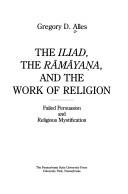
ISBN: 0271013206 Year: 1994 Publisher: University Park (Pa.) : Pennsylvania state university press,
Abstract | Keywords | Export | Availability | Bookmark
 Loading...
Loading...Choose an application
- Reference Manager
- EndNote
- RefWorks (Direct export to RefWorks)
Comparative literature --- Comparative literature --- Epic poetry, Greek --- Epic poetry, Sanskrit --- Hinduism in literature. --- Religion in literature. --- Greek and Sanskrit. --- Sanskrit and Greek. --- History and criticism. --- History and criticism.

ISBN: 0801429986 Year: 1994 Publisher: Ithaca (N.Y.) : Cornell university press,
Abstract | Keywords | Export | Availability | Bookmark
 Loading...
Loading...Choose an application
- Reference Manager
- EndNote
- RefWorks (Direct export to RefWorks)
Epic poetry, Greek --- Grief in literature. --- Oral tradition --- Rites and ceremonies in literature. --- Rites and ceremonies --- Sympathy in literature. --- War in literature. --- History and criticism.
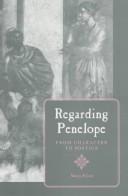
ISBN: 0806129611 Year: 1994 Publisher: Norman : University of Oklahoma Press,
Abstract | Keywords | Export | Availability | Bookmark
 Loading...
Loading...Choose an application
- Reference Manager
- EndNote
- RefWorks (Direct export to RefWorks)
Epic poetry, Greek --- Women and literature --- Poésie épique grecque --- Femmes et littérature --- History and criticism --- Histoire et critique --- Homer --- Homer. --- Penelope --- Characters --- Penelope. --- In literature.
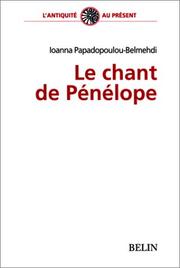
ISSN: 12575887 ISBN: 270111764X 9782701117645 Year: 1994 Publisher: Paris : Belin,
Abstract | Keywords | Export | Availability | Bookmark
 Loading...
Loading...Choose an application
- Reference Manager
- EndNote
- RefWorks (Direct export to RefWorks)
À travers le personnage de Pénélope et son tissage toujours repris, se dessine en creux une autre Odyssée : celle de l'attente d'Ulysse, d'une mémoire féminine qui arrête la durée pour donner au héros le temps de rejoindre Ithaque. Pariant sur la cohérence d'ensemble de l'épopée, Ioanna Papadopoulou-Belmehdi voit dans la toile de Pénélope "le code d'accès à la structure sinueuse de la poétique odysséenne" et sait alors entendre, dans la répétition de l'histoire de Pénélope, éclatée en plusieurs versions qui ne consonnent pas, une mise en dialogue au sein même du texte de l'Odyssée. Alors se révèle l'intériorité de ce "personnage-penseur" qui, pour peu qu'on prenne au sérieux son détissage, n'est ni incolore ni conforme, mais invente l'analyse pour des générations de philosophes.
Penelope (Greek mythology) --- Pénélope (Mythologie grecque) --- Homer. --- Pénélope (Mythologie grecque) --- Penelope --- Epic poetry, Greek --- Women and literature --- History and criticism --- Homer --- Characters --- Epic poetry, Greek - History and criticism --- Women and literature - Greece --- Homer - Characters - Penelope --- Penelope - (Greek mythological character) in literature --- Homer. - Odyssey
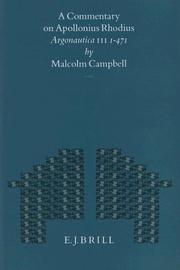
ISBN: 9004101586 9004329463 9789004101586 Year: 1994 Volume: 141 Publisher: Leiden : E.J. Brill,
Abstract | Keywords | Export | Availability | Bookmark
 Loading...
Loading...Choose an application
- Reference Manager
- EndNote
- RefWorks (Direct export to RefWorks)
This is a commentary on the third book of Apollonius' Argonautica , one of the most influential and admired products of the Hellenistic era. The author sets out to deal comprehensively with all important aspects of the work; in particular, proper attention is paid for the first time to the poet's constant manipulation of the two Homeric epics; many thorny problems of text and interpretation are examined afresh; and a wealth of hitherto unadduced illustrative material drawn from Greek and Roman poetry of various genres and periods is used to shed light on a number of issues. The volume closes with a series of detailed digestive indexes dealing with diction, models and imitations, language and style, metre, transmission, mythology, religion, geography, ethnography and aetiology.
Apollonius of Rhodes --- Argonauten (Griekse mythologie) in de literatuur --- Argonautes (Mythologie grecque) dans la littérature --- Argonauts (Greek mythology) in literature --- Epic poetry, Greek --- Poésie épique grecque --- History and criticism --- Histoire et critique --- Apollonius, --- Argonauts (Greek mythology) in literature. --- History and criticism. --- -Argonauts (Greek mythology) in literature --- Greek epic poetry --- Epic poetry, Classical --- Greek poetry --- Apollonius Rhodius --- Apollon, --- Apolloniĭ, --- Apollonio, --- Apollonios, --- Apollonios Rhodios --- Apollonios Rhodský --- Apolonio, --- Apolonios Rodoseli --- Apolonios, --- Rhodius, Apollonius --- Rodosskiĭ, Apolloniĭ --- أبولونيوس، --- Apollonius de Rhodes --- Apollonius van Rhodos --- Apollonios van Rhodos --- Poésie épique grecque --- Argonautes (Mythologie grecque) dans la littérature --- Epic poetry [Greek ] --- Apollonius, - Rhodius. - Argonautica. --- Epic poetry, Greek. --- Argonautica (Apollonius, Rhodius) --- Argonautika (Apollonius, Rhodius) --- Apollōniou tou Rhodiou Argonautikōn biblia dʹ (Apollonius, Rhodius) --- Argonautikōn biblia dʹ (Apollonius, Rhodius) --- Argonautikōn biblia tessara (Apollonius, Rhodius) --- Apollonii Rhodii Argonauticorum libros quatuor ... recensuit Ludovicus Hörstel (Apollonius, Rhodius) --- Argonauticorum libros quatuor ... recensuit Ludovicus Hörstel (Apollonius, Rhodius) --- Epic poetry, Greek - History and criticism.
Book
ISBN: 3631469829 Year: 1994 Volume: 63 Publisher: Frankfurt am Main,New York : P. Lang,
Abstract | Keywords | Export | Availability | Bookmark
 Loading...
Loading...Choose an application
- Reference Manager
- EndNote
- RefWorks (Direct export to RefWorks)
Book
ISBN: 0801430410 9780801430411 Year: 1994 Publisher: Ithaca : Cornell University Press,
Abstract | Keywords | Export | Availability | Bookmark
 Loading...
Loading...Choose an application
- Reference Manager
- EndNote
- RefWorks (Direct export to RefWorks)
Epic poetry, Greek --- Odysseus (Greek mythology) in literature --- Gods, Greek, in literature --- Heroes in literature --- Poésie épique grecque --- Odyssée (Mythologie grecque) dans la littérature --- Dieux grecs dans la littérature --- Héros dans la littérature --- History and criticism --- Histoire et critique --- Homer. --- Bards and bardism in literature --- Homer --- Poésie épique grecque --- Odyssée (Mythologie grecque) dans la littérature --- Dieux grecs dans la littérature --- Héros dans la littérature --- Epic poetry, Greek - History and criticism
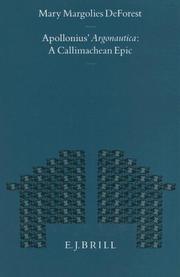
ISBN: 9004100172 9004329471 9789004100176 9789004329478 Year: 1994 Volume: 142 Publisher: Leiden : E.J. Brill,
Abstract | Keywords | Export | Availability | Bookmark
 Loading...
Loading...Choose an application
- Reference Manager
- EndNote
- RefWorks (Direct export to RefWorks)
The Argonautica was said to have been the source of a quarrel between Apollonius, who wrote what looks like an epic poem, and Callimachus, who denounced the writing of epic poetry. Although the quarrel did not take place in the real world, its issue controls the poem. The heroes are determined to take part in a Homeric epic, which the Callimachean narrator refuses to write. Drawing on the methods of modern literary theorists but eschewing the jargon, DeForest shows how Apollonius uses the literary dispute in Alexandria to give a three-dimensional quality to his poem. The amusing conflict between heroes and narrator turns serious when the levels of narrative split apart and Medea steps into the gap as a free-standing figure, the forerunner of powerful women in fiction.
Apollonius of Rhodes --- Argonauten (Griekse mythologie) in de literatuur --- Argonautes (Mythologie grecque) dans la littérature --- Argonauts (Greek mythology) in literature --- Epic poetry, Greek --- Poésie épique grecque --- History and criticism --- Histoire et critique --- Apollonius, --- Callimachus --- Influence. --- Argonauts (Greek mythology) in literature. --- History and criticism. --- -Argonauts (Greek mythology) in literature --- Greek epic poetry --- Epic poetry, Classical --- Greek poetry --- Apollonius Rhodius --- Kallimakh --- Kallimachos --- Kālīmākhūs al-Qūrīnī --- Qūrīnī, Kālīmākhūs --- Calímaco --- Callimaco --- Kallimach --- Callimaque --- Καλλίμαχος --- Apollon, --- Apolloniĭ, --- Apollonio, --- Apollonios, --- Apollonios Rhodios --- Apollonios Rhodský --- Apolonio, --- Apolonios Rodoseli --- Apolonios, --- Rhodius, Apollonius --- Rodosskiĭ, Apolloniĭ --- أبولونيوس، --- Callimachus Cyrenaeus --- Kallimachus --- Kallimachos van Kyrene --- Apollonius de Rhodes --- Apollonius van Rhodos --- Apollonios van Rhodos --- Poésie épique grecque --- Argonautes (Mythologie grecque) dans la littérature --- Epic poetry [Greek ] --- Apollonius, - Rhodius. - Argonautica. --- Epic poetry, Greek - History and criticism. --- Apollonius, Rhodius.
| Listing 1 - 10 of 22 | << page >> |
Sort by
|

 Search
Search Feedback
Feedback About UniCat
About UniCat  Help
Help News
News